Note: This review contains some major spoilers, but a warning will be given before the paragraphs in question and a link included to help newcomers to the film to bypass them.
If you learned that you only had a few weeks to live and that you will feel fine until you are suddenly struck down, how would you chose to spend those final days? I have a feeling that that we might choose when we are 20 years of age will be different to what we'd select at 50. At 20, just about anything is on the table, or at least it should be. At 50 the same rule theoretically applies, but at that age there's a good chance you'll have the feelings of a partner and even children to consider. And then there's the cost of whatever plans you might make. A 20-year-old could probably spend what little they had and even borrow a bit more if they felt cheeky enough, but would the 50-year-old you feel so comfortable cleaning out the family savings for a big final splash? But what if you were in your mid-30s and had managed to save a little and had never found that special someone or achieved anything of note with your life? What might you do then?
In the 1950 British film Last Holiday the individual in question is lonely and unappreciated farm equipment salesman George Bird (Alec Guinness), who at the start of the film is informed by his doctor that he has a rare condition known as Lampington's Disease, which looks set to kill him sometime in the next few weeks. Acting on an offhand suggestion from this brusque physician, George quits his job, withdraws his spends his modest life savings and heads off to a fancy hotel at an upmarket seaside resort, where his newly discovered, nothing-to-lose inspired confidence opens up the sort of opportunities and good fortune that have previously eluded him.
Before departing he submits to the sales patter of a tailor looking to flog a set of second-hand Saville Row suits, and on arriving at the Regal Hotel in Pinebourne (a fictional resort created for the film) these upmarket clothes and two well-travelled suitcases donated by the tailor make him the subject of considerable curiosity with the other guests. He's not been there long before he meets inventor Rufus Chalfont (Wilfrid Hyde-White), whom he inspires to start work on a redesign of the Chalfont Subsoiler, a machine that George used to sell and whose design flaws he is intimately familiar with. His forthright comments to government minister Bellinghurst (Campbell Cotts) give the politician welcome food for thought even as they make his secretary Prescott (Brian Oulton) uncomfortable, while his non-judgemental friendliness to self-made food retailer Joe Clarence (Sid James) and his perennially upbeat wife Daisy (Jean Colin) leads to substantial wins both on the horses and at poker. He gets into the good books of the hotel's Italian manager Gambini (Grégoire Aslan) when he puts over-demanding guest Sir Robert Kyle (Moultrie Kelsall) firmly in his place, and even catches the eye of the attractive Sheila Rockingham (Beatrice Campbell), who becomes quickly intrigued by this mystery man's directness and honesty. Yet it's the friendship he strikes up with no-nonsense housekeeper Mrs. Poole (Kay Walsh), to whom he comes close to confiding his secret and whose advice to tell the other guests exactly what he thinks ("It'll do them good") proves to be the kicking-off point for the opportunities that follow.
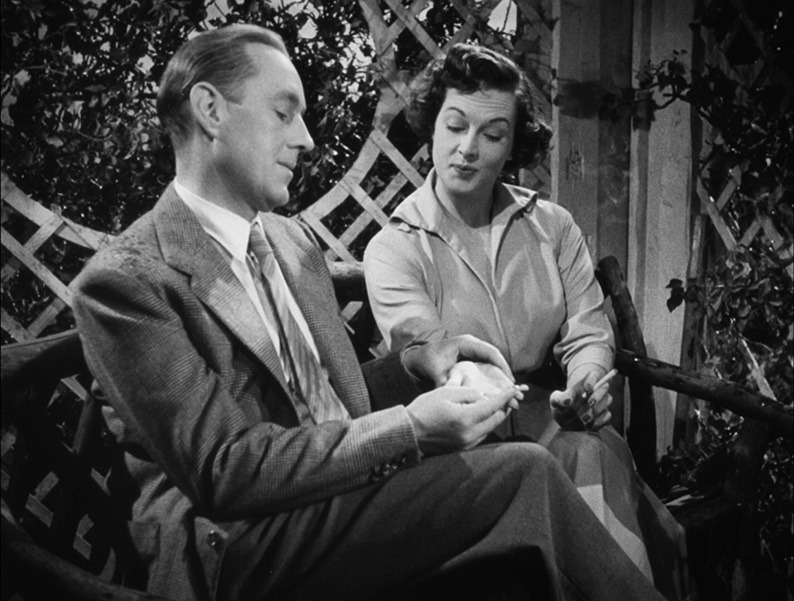
As his new friendships with Chalfont, Bellinghurst and Clarence lead to offers of business partnerships and a place on the National Agricultural Machinery Board and his fondness for the married Sheila comes close to developing into a romance, the grim irony of George's situation starts to hit home. Odd portents of his fate are everywhere: the Ace of Spaces (the death card, in case you didn't know) makes two separate fortune-changing appearances; a raggedy street fiddler (played by concert violinist David McCallum, who refreshingly plays instead of badly miming the instrument) to whom George gives a few pennies before heading to Pinebourne reappears clean shaven and in dinner dress at the hotel playing the very same tune; and an unfortunately timed dinner gong almost seems to be announcing that his time has finally come. Even innocuous comments made by fellow guests in good jest take on a secondary meaning for George, his impending demise highlighting the many ways in which death has wormed its way into everyday phrases. Pleasingly, there's never a sense that George has undergone a sudden personality change here, with his seemingly new-found confidence fuelled as much by his skill as a salesman (the increasing desperation of his boss's attempts to persuade him to stay after he quits confirm that he was damned good at his job) as his realisation that he has nothing left to lose.
Last Holiday was written and produced by the highly respected novelist and playwright J.B. Priestley, whose adapted-for-screen works include The Old Dark House, An Inspector Calls and A Severed Head, and who just occasionally would also pen an original screenplay, though following this film he worked primarily in television. As you would expect from Priestley, the dialogue is consistently smart and provides the film with much of its pleasure and replay value, and while there is an inevitability to some of the plot development – as soon as we learn that Sheila's husband Derek (Brian Worth) is in trouble and needs money, we know he'll get what he needs from George – the path to any predicted conclusions rarely follows the expected course. The supporting cast is an absolute dream, and as well as the aforementioned roll call of screen stars of the day includes Muriel George as the bossy Lady Oswington, Esma Cannon as her mouse-like companion Miss Fox (the sequence in which she gets drunk and speaks her mind is a delight), and Bernard Lee as police Inspector Wilton, who is at the hotel to investigate Derek's misdeeds. But it's Alec Guinness, in what remains perhaps my favourite of his early performances, who rightly dominates here. His delivery of Priestley's dialogue is a joy, but it's the little touches he brings to his performance that make it so special, the way he toys with an iron as he contemplates whether to let Mrs. Poole in on his secret, or the thoughtful look that almost borders on whimsey that drifts into his face after he assures Sheila that he has had to face up to be being told the truth, enigmatically not choosing to reveal about what.
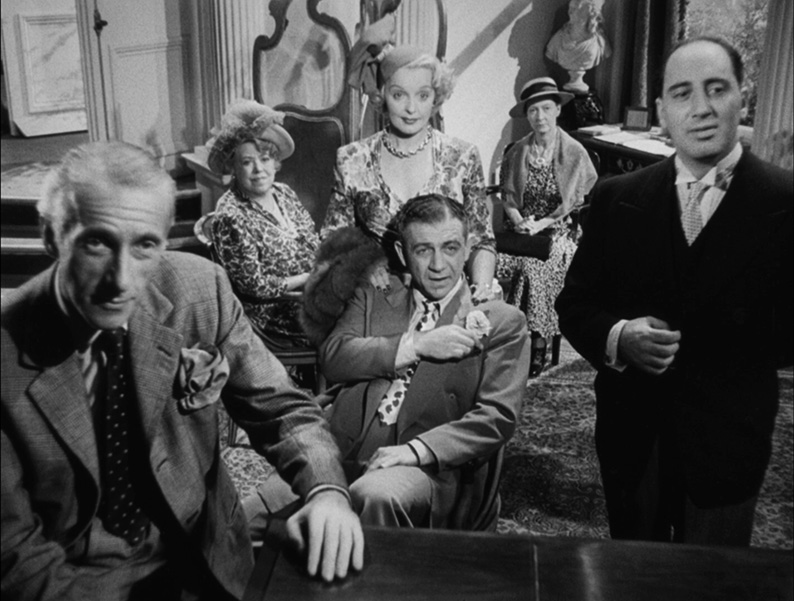
Priestley's humanitarian and socialist leanings are evident in a number of aspects, notably the central conceit that an ordinary working man could have more insight in life, human nature and even politics than the wealthy elite that populate the hotel, and that by speaking his mind to them he could have a positive impact on their lives. With this in mind, it's no surprise that the most instantly likeable characters are the hotel staff, from the strong and pragmatic Mrs. Poole to cheery and whisper-voiced maid Maggie (Heather Wilde), and when a union organiser (Hal Osmond) calls the staff out on strike, there's no demonising of him or his actions, just a whisper of comical mockery from receptionist Miss Mellows (Helen Cherry). Despite his ill-timed good fortune, George never forgets his roots and remains defiantly proud of them, responding to Sheila's snobbish dismissal of the down-to-earth Jo and Daisy as being "as common as dirt" with a snappily delivered, "So am I." And when the strike leaves the hotel without staff for the evening, it's George who persuades them to all muck in together to create their evening meal and even wash up after, a process that sees even the most aristocratic guest spend an evening in a service job as part of a worker's collective.
Where this socio-political subtext seems to stumble is in the film's final scenes, an aspect of which annoyed me so much on my first viewing many years ago that it became the thing that I most remembered the film for (well that and a late-story line of dialogue whose timing and delivery – by Guinness, of course – has made it one of my all-time favourites, but which would be unfair of me to share here). Yet I do have to talk about that ending, in part because of how and why it impacted on my enjoyment of the film on my first viewing, but also how the passing of time and an awareness of what was to come changed how I feel about it all these years later. If you've never seen the film then you should definitely bypass the following four (!) paragraphs (which you can do by clicking this link) and instead watch the movie and form your own opinions on how it concludes. The next bit is for those who've seen the film or already know how the plot unfolds. You have been warned.
Right, we're now in serious spoiler territory. This is your final warning. As those who've seen the film will be aware, a not completely unpredictable late-film twist reveals that George has been misdiagnosed by a busy and disorganised doctor who has mixed up his x-rays with those of a man with a similar name. The error is discovered via the sort of chance event you only find in movies, when Sir Trevor Lampington (played the ever-lovely Ernest Thesiger), the man who gave his name to the condition with which George has been diagnosed, checks into the hotel and just happens to be in the very person that George reveals the name of his condition to. It's a perfectly timed and hugely uplifting revelation, one that allows a decent and likeable man who has never achieved anything of note to finally get the recognition and chance at happiness that he has for so long deserved and that we've spent the whole film assuming he'd never get to see.
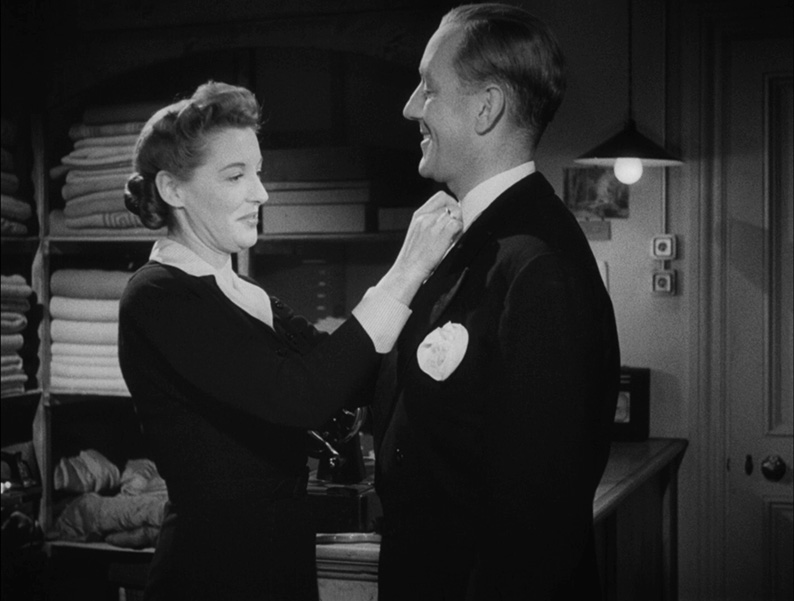
But Priestley is not finished with the ironies yet, and after revisiting his doctor to deliver my favourite line, George is driving back to Pinebourne when he swerves to avoid killing a dog (one that its owner was taking to the vet to be put down, no less – the ironies just pile up) and is fatally injured in the crash and thus dies after all. When I first saw the film, I can't tell you how pissed off I was at the seeming cruelty of this second twist, which for me played like a narrative equivalent of being given something I really wanted but thought I'd never get, allowed to enjoy it for a couple of minutes and then having it snatched from my hand and smashed on the floor. It also seemed to undermine the film's socio-political subtext by suggesting that a working man like George, for all his good deeds, ultimately has no place in the world of the wealthy elite and that any attempt to move in such circles would see him sacrificed on the altar of fate. Watching the film again and knowing this double-twist is coming, I'm not sure I was any happier about it or its societal implications, but did find myself wondering if Priestley's real message was not that someone like George should not attempt to infiltrate high society, but that the self-absorbed and cosseted nature of this society would see its members ultimately reject him, whatever the positive impact he might have had on their lives. It's a reading given weight by the speed with which the assembled guests move from speaking warmly of George to dismissively putting him down simply because he is late for a dinner being held to celebrate his new lease of life, one that unbeknown to them has been cut tragically short.
I was definitely struck by how rare it is for film of this vintage, particularly one so otherwise light-hearted in tone, to kill off its lead character, leave the leading lady in a state of distress, and leave the more unworthy characters to go about their various businesses. No question, George's dying moments in the hospital are deeply moving (Guinness is just superb here), and there is an underlying suggestion that he is content to leave the world now because he feels that his good work is complete, but again I was left with the suspicion that for all the lives he touched, there are as many others who will take nothing useful from their time in his company. Most tragic of all is the impact his death has on Mrs. Poole, who as the film concludes wanders into the hotel garden looking lost and lonely and facing a future that will likely be forever tainted by the notion of what might have been. Yet this time around, probably because I knew it was coming, I was not stung anything like as painfully by this final twist of fate. It may rob the film of the upbeat ending that was only revealed to be on the cards at all a few minutes earlier, but I now find it easy to appreciate its boldness and the fact that it offers more than one subtextual reading for those who are game (see the extra features for more on this).
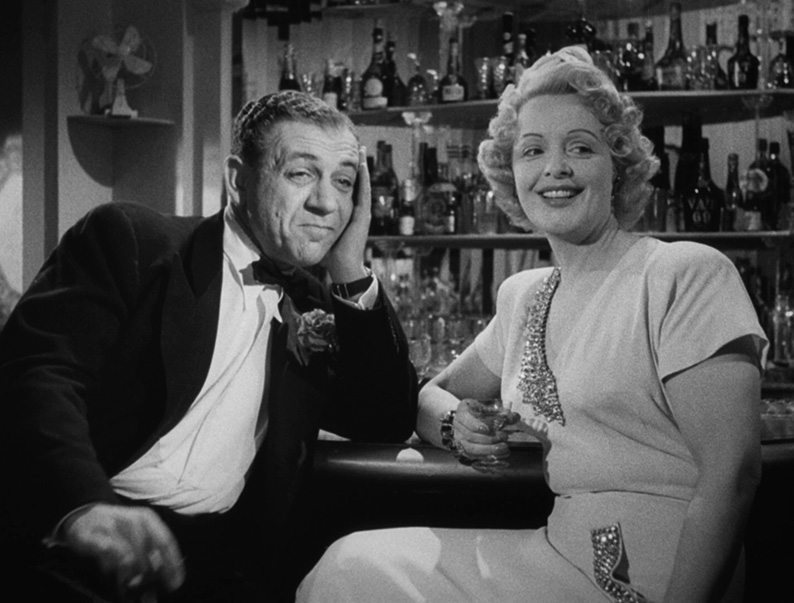
In the end, this matters a lot less than I once felt it did, as while still I'm still not sure how I feel about the ending, I was genuinely delighted to rediscover how smart, how witty and how immensely enjoyable the journey to this still bold conclusion remains all these years later. Smartly but unobtrusively directed by Henry Cass, it's an unfairly neglected work whose cast and screenplay alone are joyous enough to pull you back for repeat viewings, and one of the key early works of a young Alec Guinness, having been made the year after his widely celebrated work in Kind Hearts and Coronets and the year before memorable turns in The Lavender Hill Mob and The Man in the White Suit. It also proves to be an interesting barometer of changing financial times. According to the Bank of England's currency calculator, the Regal Hotel's £50 a week room charge would be £1,726 today, whilst George Bird's £9 weekly salesman's salary would net him a surprisingly modest £16,157 a year today. Yet in 1950 George was still able to pay his rent, buy clothes and feed himself whilst putting enough money away to buy a set of second-hand Saville Row suits and spend a few weeks at an exclusive hotel. I can't help wondering what Priestley would have had to say about the impossibility of being able to do likewise on such a salary today.
Last Holiday is a film I have a long-standing affection for, which is why I was so fired up by the news of this upcoming Blu-ray release. So how does it look in high definition? Well...it's alright, I guess. The problem is that we've been spoilt for some years now by the sparkling restorations found on discs put out by the likes of Indicator, Arrow, Eureka and the BFI, and my expectations were thus for picture quality on a par with such releases, and to be honest it's not. On the positive side, it's clean and free of damage and sits steadily in frame without any errant jitter. The contrast is reasonably well balanced, but the black levels are a tad aggressive in places, and the image sometimes has a rather glum look to it. I know not whether this is a restoration or a digital remaster, or from what material the transfer was sourced, but though always very watchable and definitely superior to what you'd get from a DVD, the detail is nowhere near as crisp as that on a restored-from-the-negative Indicator Blu-ray, and there are plenty of moments where this slight picture softness becomes acutely visible. An early one occurs on the wide shot when George leaves the doctor's office and walks towards a horse whose head is in the foreground of the image – as George steps into the street the detail on his face is fuzzy and indistinct (and for the record, the writing on the window beside him is clearly legible, so this is not a depth-of-field issue), and even when he reaches the horse and is considerably larger in frame, the detail on his moustache remains unclear. There is some faint flickering but this is par for the course for a film of this vintage, and film grain is visible throughout. The framing is the original 1.37:1 Academy ratio.
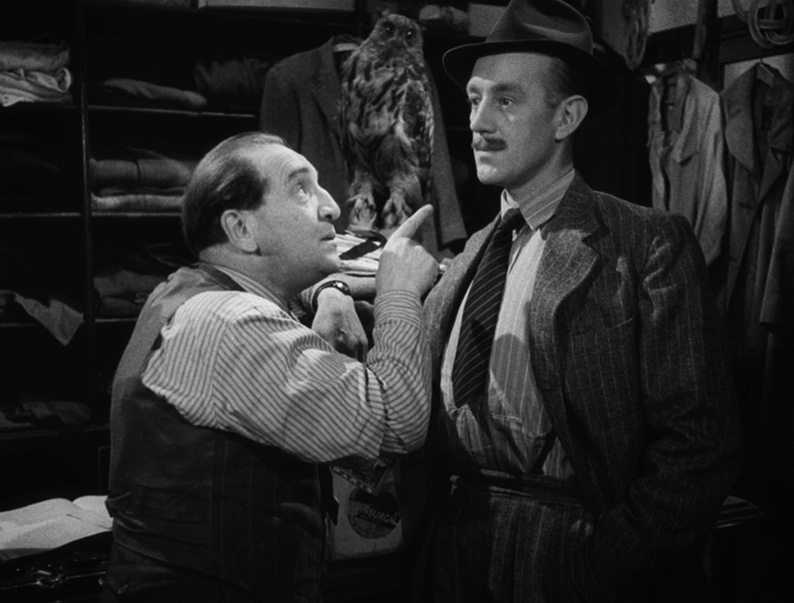
The Linear PCM 2.0 mono track has the expected range restrictions for a film of this vintage, but is otherwise free of background hiss, fluff or damage.
Optional English subtitles for the hearing impaired are available.
Interview with Cultural Historian Matthew Sweet (24:02)
Enthusiastically chatty author and film critic Matthew Sweet most engagingly explores the work and politics of J.B. Priestley – whom he neatly describes as "a poet of the welfare state" – and some of the things that make Last Holiday special. He praises Guinness's performances as one of his best (no argument here), suggests some very interesting subtextual readings of the George Bird character as it relates to that ending, and reveals that of all the films that Priestley was involved in, this was the one that he was the most fond of. A really enjoyable and informative piece, but one to watch after the film – "Which is why it's called an extra!" Sweet reminds us – as there are spoilers here for those newcomers.
Personalities: J.B. Priestley (1944) (2:27)
A standard definition Pathé piece that takes a bite-sized look at Priestly at work, with a posh-voiced narrator observing that the author always has a pipe in his mouth when writing and that he types with two fingers (as do many of us), all set to a lush romantic score. Concludes with Priestley himself addressing the camera to talk about his work and what a budding writer should focus on.
Behind the Scenes Stills Gallery (0:28)
Two publicity portraits and seven behind-the-scenes photos in a rolling gallery that only gives you three seconds to appreciate each image before hopping on to the next one, so keep your finger hovering over the pause button if you want a longer look. The behind-the-scenes images are definitely of interest.
If you don't know this film but the title seems familiar it's because it became the subject of an American remake in 2006, one directed by the talented Wayne Wang, with Queen Latifah in the Alec Guinness role. Frankly, you can keep it, as the original is smarter, sharper, bolder and a lot more entertaining, and is absolutely worth hunting out if you've never seen it. I'm in two minds about Studiocanal's Blu-ray, which features an OK rather than outstanding transfer, but it's still very watchable and benefits from Matthew Sweet's excellent contribution to the special features. If you're a fan of the film then this is as good a disc version as you're likely to find for the immediately future (unless a label like Criterion embarks on a restoration from the original negative for a US release), so is still worth picking up if the price is right.
|